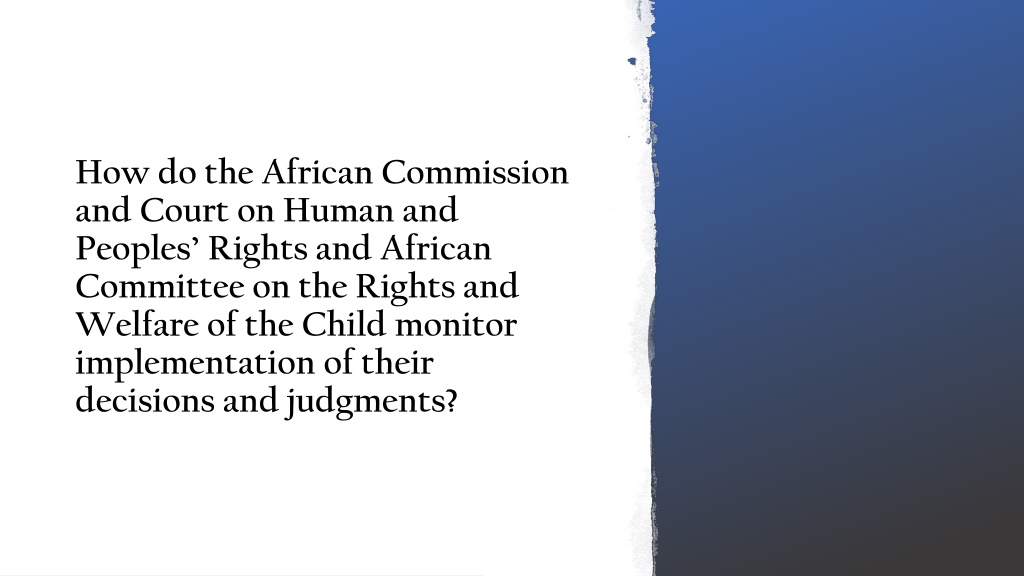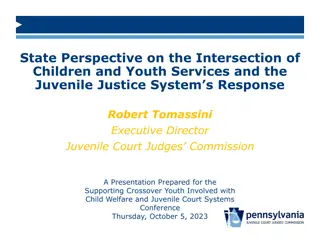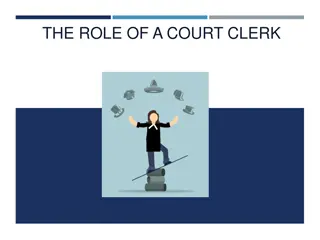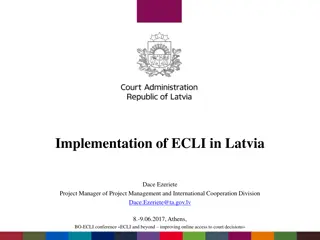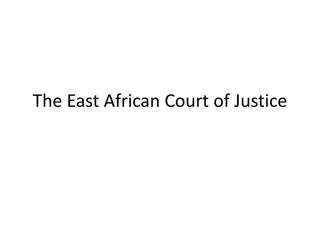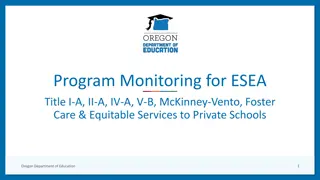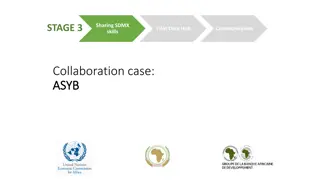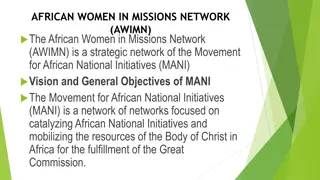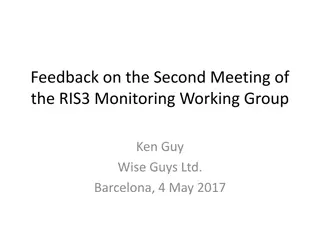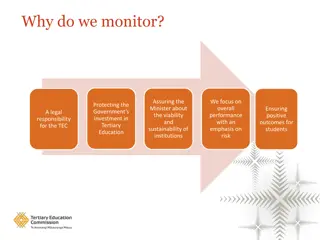Monitoring Implementation of Decisions by African Commission & Court
The African Commission and Court on Human and Peoples' Rights, along with the African Committee on the Rights and Welfare of the Child, monitor the implementation of their decisions and judgments through various mechanisms such as submission of execution reports, hearings, on-site visits, and reporting to the AU policy organs. Parties are required to provide written information on actions taken to implement decisions, and reminders are sent for responses. States are urged to appoint focal points and develop national plans for implementation. The Court has no established criteria for determining full compliance.
Download Presentation

Please find below an Image/Link to download the presentation.
The content on the website is provided AS IS for your information and personal use only. It may not be sold, licensed, or shared on other websites without obtaining consent from the author. Download presentation by click this link. If you encounter any issues during the download, it is possible that the publisher has removed the file from their server.
E N D
Presentation Transcript
How do the African Commission and Court on Human and Peoples Rights and African Committee on the Rights and Welfare of the Child monitor implementation of their decisions and judgments?
- After the judgment is adopted by the Court, it is sent to the parties as well as relevant organs of the AU including the EC. Then: - The State should send an execution report to the Monitoring Unit at the Registry of the Court, based on a template provided by the Court. - Timeframes for submission of the report and authorised extensions are determined by the Court. - The Court has asked that States have focal points to maintain contact with the Court The Court will then make an assessment, drawing upon other sources, on the level of implementation. How does the African Court monitor the implementation of its judgments and rulings?
The Court can hold a hearing The Court can undertake an on-site visit. A memorandum of understanding between the parties can also be endorsed by the Court. The Court can adopt a judgment on compliance setting out its findings. The Court will inform the AU policy organs of the progress of compliance, specifically through the PRC. The African Court publishes in its activity report a list of States and information on implementation.The information lists the particular reparation ordered by the Court and then provides detail on what the State has done, if anything, to implement that measure. The State can request technical assistance from the Court on how to interpret the judgment. Parties can at any stage ask the Court to assist in reaching an amicable settlement, conduct an on-site visit, hold a hearing or make a decision on implementation. Mechanisms if there is no compliance The Court has, as yet, developed no criteria for determining whether a State has complied fully or partially with its decision.
Rule 125 (Rules of Procedure 2020): Parties to provide written information, within 180 days from the transmission of the decision, on action taken to implement the decision. This information is shared with the other party who can respond within 60 days Further information can be sought from the State within 90 days of its initial response. How does the African Commission monitor the implementation of its decisions? Reminders will b sent if no response is received and an additional 90 days will be given for a reply. The African Commission will report to each session on the measures taken by the states to implement the decision It can report to the AU policy organs
The Commission has asked that States: Inform the Secretariat of changes in contact information; Appoint staff as focal points for communications; Create a central mechanism or unit at national level responsible for coordinating issues regarding implementation of decisions of the Commission ; Develop national plans for implementation and follow-up of decisions from regional and international treaty bodies. These plans should clearly indicate the activities and the stakeholders responsible for implementation . Obtaining information from the State authorities The Commission can also: - Ask that the State to submit an interim report on implementation; - Hold a workshop, e.g. respect of the Endorois decision: Workshop on the Status of Implementation of the Endorois Decision of the African Commission on Human and Peoples Rights to forgedialogue and strategize with the Government and civil society on the status of implementation of the Endorois decision and ways forward, and to come up with a joint road map of implementation outlining concrete steps to be taken with timelines . - Hold an implementation hearing, it has done this in relation to cases against Mauritania and the Endorois decision
Use of its special mechanisms: In 2007 the Special Rapporteur on Refugees visited Mauritania and Mali in order follow-up on decisions. Adopt resolutions Procedures to monitor and encourage implementation Use its promotional mandate: E.g. by asking questions during promotional missions to the State on the measures taken to comply with the decision, Use the State reporting procedure: - Asking questions during the examination of the Article 62 report about the status of implementation of decisions Offer its good offices to facilitate implementation of the decision
The ACERWC has produced Guidelines for Implementation of Decisions on Communications: States are required to submit a report on implementation 180 days after receiving the decision of the Committee, with an extension of a further 90 days if no report is submitted. The Committee can go on a follow-up visit. A hearing on implementation can be held if the implementation report lacks clarity or is unsatisfactory , or if no report is submitted. The State s report will be sent to the applicants and a date for the hearing fixed within 30 days of the decision. The ACERWC can refer the case to the Assembly of the AU for appropriate intervention if the State has failed to take any measures to implement the decision. How does the ACEWRC monitor the implementation of its decisions?
Hearings on implementation The hearing will take place at the session after the submission of the report. The State will make an oral presentation on their report Hearings can be open or closed. Applicants can comment on the report including the status of and any gaps in implementation and what may be preventing the State from implementing the measures After the hearing, the ACERWC will adopt recommendations to assist the State in implementing the decision Committee members can ask questions
What role for the AU in monitoring and enforcing decisions and judgments? All three bodies report to the AU policy organs with respect to implementation of their decisions and judgments. The Assembly of the AU has the ultimate threat of imposing sanctions for any State that fails to comply with the decisions and policies of the Union , arguably including those of the three human rights bodies.
The Protocol establishing the African Court requires that the Executive Council will monitor execution of the judgment of the Court The Court submits a report to each regular session of the Assembly of the AU and this includes information on the cases in which a State has not complied with the Court's judgment . When considering the report from the African Court the Executive Council has e.g. urge[d] Member States to commit unconditionally to, and comply with judgements rendered by the Court The Executive Council has since decided that it will not list, in its own decisions, the names of countries that have not complied with Court judgments. Reports on implementation will be sent by the Court to the PRC The PRC will consider what the State should do to implement the decision and identify relevant assistance from AU organs If the State fails to implement, the PRC can report to the Executive Council The Executive Council can consider the reports of the PRC and Court, then refer it back to the PRC, adopt a decision on compliance, offer its own good offices for a settlement, appoint an AUC Chairperson or special envoy to facilitate negotiations. The Executive Council can submit decisions for consideration by the AU Assembly which can then adopt these, offer its own good offices to the parties or take further action under Article 23 of the Constitutive Act. A fund will be set up to provide support for States in the implementation of decisions. What role for the AU in monitoring and enforcing implementation of judgments of the ACtHPR?
The ACHPR can refer the issues of non-compliance with a decision to the policy organs of the AU and ask them to take the necessary measures for the implementation of its decisions . The ACHPR can provide detail on the status of implementation in its activity reports. The Executive Council will adopt a decision on the activity report of the African Commission that authorises the publication and calls on States to e.g. implement decisions and recommendations of the ACHPR, respond to Urgent Appeals from the ACHPR, and to comply with Provisional Measures issued by the ACHPR . The ACHPR has recommended the PRC Sub- Committee on Human Rights and Governance could serve as an appropriate mechanism for implementation . The ACHPR also called on the AU to create an office within the AUC to serve as liaison person between the Commission and States to enhance communications . What role for the AU in monitoring and enforcing implementation of the decisions of the ACHPR?
What role for the AU in monitoring and enforcing decisions of the ACERWC? The ACERWC submits to the PRC Sub- Committee on Human Rights, Democracy and Governance a yearly report on the status of implementation of its decisions.
What can States do to implement the decisions and judgments? Ensure there is a clear line of communication between the body receiving the decision (e.g. the MFA) and the relevant ministries (e.g. Ministry of Justice, Ministry of Finance, etc.) Ensure that a specific ministry or other entity takes responsibility for coordinating implementation of the decision Consider the creation of an NMIRF (National Mechanism for Implementation, Reporting and Follow-up) Create focal points for engagement with each of the ACHPR, ACERWC and ACtHPR 1 2 3 4 Establish procedures for engagement with the legislature and judiciary in facilitating implementation of decisions Seek advice and technical assistance from the relevant body, AU organs, NHRIs and CSOs Develop a national action plan for the implementation of decisions Create a database to track measures taken to implement decisions 5 6 7 Publish information at the national level on the measures taken to implement the decision Respond to requests for information from the ACERWC, ACHPR and ACtHPR Collaborate with NHRIs and CSOS in the implementation of decisions 8 9
